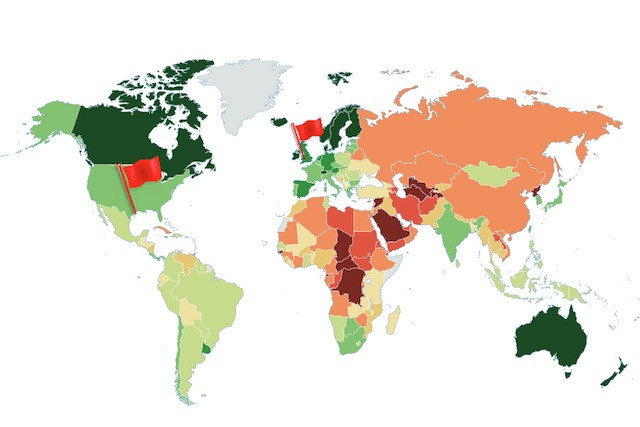Apart from the fact that the US has been demoted to a “flawed democracy”, the study has other serious findings which point to future uncertainties and possible upheavals closer to home.
Each country in the EIU report is classified as one of four types of regime: “full democracy”; “flawed democracy”; “hybrid regime”; or “authoritarian regime”. The index, on a 0 to 10 scale, is based on five categories: electoral process and pluralism, civil liberties, the functioning of government, political participation, and political culture.
Ratings for 60 indicators (each worth 0, 0.5 or 1 point) were given by experts worldwide, along with statistics from opinion polls where available.
Out of 165 states, Luxembourg ranks 11th worldwide and 8th in the EU:
Over the past 10 years, Luxembourg’s DI has fallen from 9.1 to 8.81. The only EU member states scoring better than Luxembourg are Sweden, Denmark, Ireland and Finland.
But what should be particularly worrying is that two of its neighbours are classified as flawed democracies: France (24th globally, 16th regionally) and Belgium (35th globally and 18th regionally). Furthermore, in Western Europe, Italy, Portugal, Cyprus and Greece are also classified as flawed. The report stated:
“In the developed West, a decline in political participation, weaknesses in the functioning of government and curbs on civil liberties are having a corrosive effect on some long-established democracies.”
Even more worryingly, 11 Eastern European countries which are EU member states are flawed democracies. In total, that is 17 out of 28 EU member states. Considering Luxembourg is so exposed to what is happening in its neighbouring countries and the EU, it will also have an impact sooner or later on its policies and relations. According to the EIU:
“There was a notable weakening of electoral processes in several countries in the region in 2016, suggesting that even the formal trappings of democracy are being called into question.”
This has enormous implications for European integration and the whole EU project. It can be assumed that any appetite for further EU integration has been lost.
“The revenge of the deplorables”
Thus titled the EIU wants to draw attention to the “left behind”, those who are unemployed, who have seen their wages stagnating and those who are disenchanted by the so-called political elites and establishment in general.
The Economist considers that a “variety of social and economic outcomes can be consistent with political democracy, which is a separate concept”
While the Economist does not go so far as to include any levels of economic and social well-being in its indicators, it nevertheless draws the roots of the contemporary crisis of democracy very closely to the process of de-industrialisation, structural economic changes, declining wages and socio-economic changes such as the entry of women into the labour force.
Parties have lost touch
Another factor is that political parties have lost touch with their electorates and moved closer to the centre ground, making it seem there is less choice. The economic and financial crisis and lately the refugee crisis have also eroded trust in institutions, as politicians scramble to find solutions.
The EIU sees new political fault lines:
“over issues such as globalisation versus national sovereignty, cosmopolitanism versus national identity, and open borders versus immigration controls. The populists are winning ground because they have been talking about these things, whereas traditional political elites have evaded these issues. The Brexit and Trump votes have brought this divide out into the open. Instead of debating the merits or otherwise of these opposing standpoints, some have sought to delegitimise these views and disparage those who hold them either as xenophobes in thrall to dangerous demagogues or ignorant dupes of post-truth politics.”
Use of referenda undemocratic?
Some people have drawn the conclusion from the Brexit referendum that democracy has become too direct and that the electorate cannot be trusted to make sensible decisions.
It is presented as a threat to representative democracy. The EIU wrote:
“Arguably, however, the increasing recourse to referendums suggests that the prevailing system of representative democracy is failing to engage people in discussing the important issues of the day (…). The trend towards declining political participation (…) is a threat to the future of democracy. Democracies do not end when they become “too democratic”; they begin to founder when they exclude the demos.”
